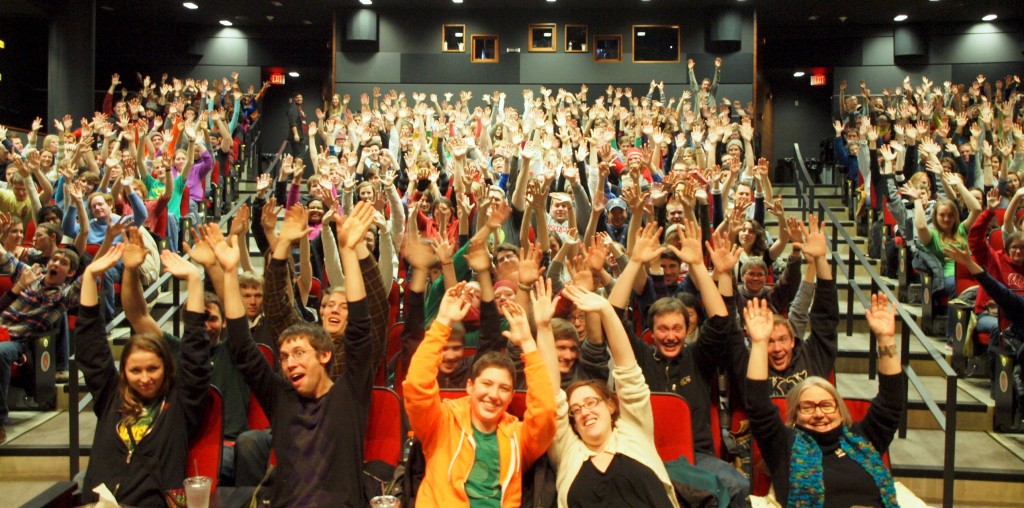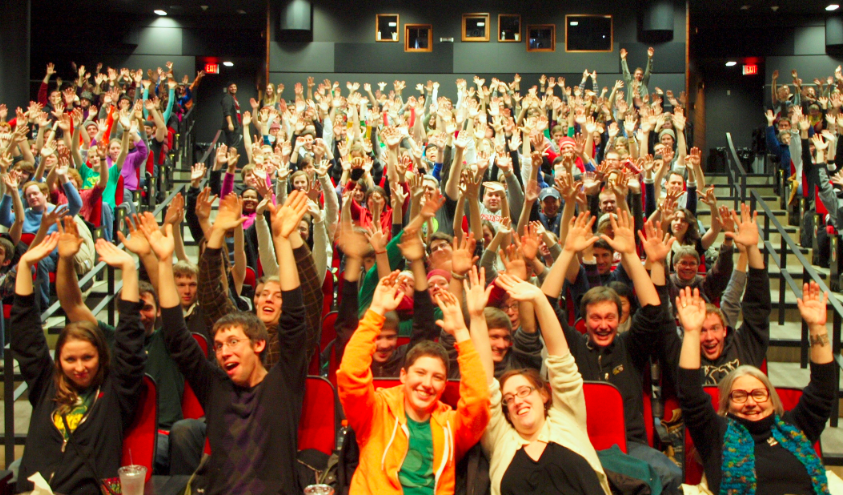
As an old promo read, “WUD Film. Good film.” Now more than ever.
There’s something different about WUD Film this year. No, they didn’t bow to my demands and finally change their name to the “Wisconsin Unicorn Directorate.” The WUD Film Committee has however increased its collaborations this year and by a significant amount.
In addition to bringing audiences great films the’ve come to expect through midnight screenings, sneak previews, and monthly themes, WUD Film has also stepped up its game on a series of collaborations with organizations both within and outside of the University of Wisconsin. In the past semester alone, the student-run committee has partnered with groups as varied as the WUD Society & Politics Committee, the Arts institute, and Oxfam International to screen classics like Will Wyler’s Roman Holiday, the Bollywood thriller Ek Tha Tiger, socio-political dramas like The Take, and groundbreaking documentaries in Half the Sky and Flow: For the Love of Water. And that’s just a sample.
Last week, Hari Jost, this past year’s Associate Director of Collaborations, was kind enough to talk about WUD’s increased co-presentations and what goes into each and every one of those screenings:
DK: When I was still a UW student, I remember WUD co-presenting events, but it seems like your partnerships have really ramped up this year. Is my memory just that crummy?
HJ: Your memory is not crummy! WUD Film has definitely ramped up the frequency in the amount of collaborations we do, primarily because we have such a fantastic theater now. The Marquee [at Union South] is a terrific space and with the amount of programming we do during the year, there are tons of opportunities for outside groups to work with us.
I also believe that due to the familiarity with WUD Film on campus, the chance to collaborate is better known now than what it may have been in the past. Collaborations are a common occurrence in our programming and I think groups are more comfortable getting in contact with us to request more information about what we do.
DK: Are there any other mutual benefits to WUD Film partnering with organizations like OxFam, the Mellon Workshop and UW Athletics?
HJ: There are certainly mutual benefits to partnerships. Outside groups may be able to gain more recognition about their organization’s mission or message, while WUD Film is able to broaden its programming. Collaborations brings a great amount of variety to our regular scheduling and it allows us to reach a different audience than what we may usually draw with our Hollywood, alternative, or “cult” films.
DK: Do you think partnering with these various organizations has allowed for WUD Film to have a more varied palette of films to bring to campus?
HJ: I definitely do. With collaborations, we are not restricted to one particular genre of film. We can show mainstream Hollywood films (whether they are newer or older), documentaries, narrative films, etc. Whatever a group is interested in showing, we are there to make it happen.
DK: What goes into the programming for these events? Do the organizations make recommendations on what to screen?
HJ: Primarily, groups will contact me requesting a collaboration with WUD Film. They typically already have an idea in mind of what film they would like to show, when they would like to show it, and what their cause may be. We’ve had films screened for World AIDS Day, Black History Month, etc.
If groups would like to know more about collaborations in general, they contact me for more information. In these situations, I’ll either send out a list of commonly asked questions or a co-sponsorship agreement form. Both of these tools are used to help give potential collaborators an idea of what a collaboration may entail. If they need help with movie choices or anything of that nature, WUD Film is always willing to offer suggestions.
DK: Do WUD Film directors collaborate with the organizations directly?
HJ: After deciding what the collaboration will look like, either the collaborating group or myself will pitch it to the entire WUD Film Committee. The Committee [of UW students] listens to the proposal, asks any questions they may have, and then we vote on whether we would like to pursue a given collaboration or not. A lot of it involves keeping communication open with the collaborating organization. And of course I’m there as a resource along the way for any questions, comments, or concerns that may arise. If a group is turned down for a collaboration, we still offer options as to how they can have their film screened on campus.
DK: What kind of a response has WUD Film had to these co-presented screenings? How has the turnout been?
HJ: For the most part, the response has been positive. Sometimes we’ll show films that spark powerful discussions or present Q&As that give audience members a different perspective about a topic. It’s always highly rewarding when people leave the theater and thank us for bringing these films to campus. As for turnout, it all depends on the film. We’ve seen screenings that have filled the theater, while others have only brought in maybe 20 people. No matter what the audience size may be, at the end of the day we strive to bring films that will be memorable for all audience members.
DK: Do you see WUD Film continuing this type of programming in the future?
HJ: I definitely see WUD Film continuing this. I believe WUD Film’s name has become more familiar on campus and as our recognition grows, so will collaboration requests. Even this year, we’ve seen an increase in the amount of potential collaborations. I’m looking forward to seeing what other groups WUD Film will work with in the future. We’re already fielding requests for the next year, and it’s exciting to see groups reach out to us and give us their ideas.
Many thanks to Hari for sharing her time with us. And of course, thanks to the WUD Film Committee for continuing to bring a fantastic variety of cinema to the University of Wisconsin.
WUD Film may be wrapping up its co-presentations, but its “Mini-Indie Film Festival” begins next Thursday and features a student short film competition.

